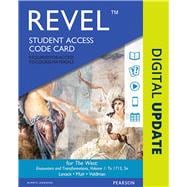DIGITAL UPDATE available for Fall 2021 classes
For courses in the History of Western Civilization.
Explore the changing nature of the West
Revel® The West: Encounters and Transformations examines the changing nature of Western civilization, helping students to understand how the definition of the West has both evolved and been transformed throughout history. Focusing on the central theme of cultural encounters, authors Brian Levack, Edward Muir, and Meredith Veldman explain how the West originated and developed through a continuous process of inclusion and exclusion resulting from a series of encounters among and within different groups. Available for Fall 2021 classes, the Digital Update better illuminates the past through new History 360 Experience simulations.
Revel empowers students to actively participate in learning. More than a digital textbook, Revel delivers an engaging blend of author content, media, and assessment. With Revel, students read and practice in one continuous experience, anytime, anywhere, on any device.
NOTE: Revel is a fully digital delivery of Pearson content. This ISBN is for the standalone Revel access card. In addition to this access card, you will need a course invite link, provided by your instructor, to register for and use Revel.











